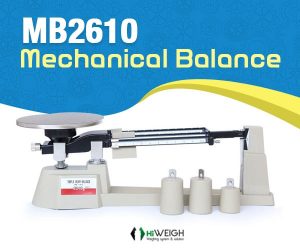

 Achieving precision is the pre-requisite as far as the functioning of a weighing balance is concerned. This is more true for the ones used in a research laboratory belonging to, say, a pharmaceutical company. This is due to the fact that the quality of a research output depends on the accurate measurement of samples. A slight error in measurement would alter the findings leading to erroneous results. For example, in the research laboratory of a pharmaceutical company, the wrong measurement of samples can alter the composition of the medicine itself. Such an outcome can have a serious impact on the health of patients taking the medicine.
Achieving precision is the pre-requisite as far as the functioning of a weighing balance is concerned. This is more true for the ones used in a research laboratory belonging to, say, a pharmaceutical company. This is due to the fact that the quality of a research output depends on the accurate measurement of samples. A slight error in measurement would alter the findings leading to erroneous results. For example, in the research laboratory of a pharmaceutical company, the wrong measurement of samples can alter the composition of the medicine itself. Such an outcome can have a serious impact on the health of patients taking the medicine.
Given the importance of ‘precision reading’ by a precision balance for laboratory, one must procure the best one in terms of quality and price. However, the best ones are characterized by the presence of certain features, which should be taken into account while buying one for your research laboratory. In addition, precision balances should meet the stringent demands of quality control as laid down by regulations, protocols and guidelines.
Let us find out the features a robust and calibrated precision balance should possess.
Multiple Units: The imperatives of research might need the weight of an element/material/substance in a particular unit. The unit can be a pound, ounce, gram or milligram. Thus, it makes sense to buy a scale that offers measurements in a particular unit. This precludes you from changing the unit of measurement frequently leading to savings on time and effort. Mostly, mechanical scales provide unit specific measurement while the electronic ones can be adjusted to the demands of research.
Capacity: Each and every weighing scale or balance comes with a rated capacity. This is exclusive of the tare weight of the containers or scoops used. To ensure weighing of the heaviest samples, it is better to get a scale with a rated capacity that is much higher than the maximum weight of the sample. Importantly, higher the capacity of a balance greater will be the cost of its load cell.
Displaying Fractions: As per the specific requirement of weighing, there are scales available that show the weight to the smallest of divisions. However, more the divisions are shown by a scale, greater will be its cost. Hence, a laboratory balance ought to show a minimum division of say, two decimal fractions.
Which one to choose? mechanical or digital: A digital scale gives a more accurate measurement in terms of units and divisions. A mechanical one, on the other hand, might not be suitable for places where a high precision is needed, say in a research laboratory. Moreover, a digital scale can be connected to a data storage device for further analysis.
Protection from Elements: There can be situations where the laboratory scales are used in places containing moisture and dust. In such a situation, a suitable scale should be used with the right water and dirt protection metrics as denoted by the IP ratings.
Conclusion
Choosing the right precision balance for laboratory can be a tricky affair. Care must be taken to source one with the right mix of features in order to obtain the best research outcomes.
